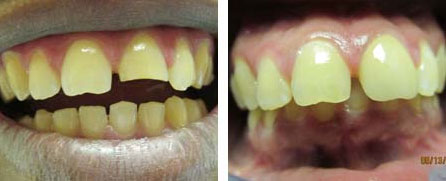Dental injuries like broken teeth rarely happen at convenient times. Right when you least expect it, dental trauma swoops in and hinders speech and your ability to eat anything beyond pudding. Plus, having a broken front tooth is pretty hard to hide.
Act Quickly to Increase Chances for Success
Drs. Michelle and Scott Weninger encourage you to act quickly after dental trauma to increase the likelihood that your tooth can be saved. Acting quickly also helps prevent further damage or decay from impacting treatment. X-rays allow the dentists to see if there is any unseen damage below the surface before they create short and long-term treatment plans. If it is at all possible to save the tooth, we will work to do so.
Let’s look at three of the common types of dental trauma.
Loose Tooth = Tooth Concussion
Yes, teeth can get concussions. A hard hit to the mouth can cause pain, bleeding, and a loose tooth or teeth. Just because the tooth stays in place, it does not mean you are out of the woods yet. Give us a call so we can rule out possible root or jaw bone damage that is not visible.
Oh, No! The Tooth Broke
Most people assume a tooth breaks as the result of a hard hit, but sometimes, hard food or candy are the culprits. Depending on the size of the piece that breaks off, pulp and roots may be exposed. This can cause moderate to severe pain. It is vital to seek treatment from the dentist as soon as possible to prevent infection, swelling, further damage, and decay. In the meantime, you can take an over-the-counter pain medicine and rinse your mouth with salt water. Avoid using the tooth by eating soft, mushy foods. If the broken edge is irritating your mouth or gums, cover with dental wax, paraffin wax, or even sugarless gum until your appointment.

Down for the Count: A Complete Knock Out
Dental avulsion is the proper name for a tooth that has been completely knocked out. Expect some pretty serious bleeding if this happens. By applying pressure, bleeding should stop within 30 minutes. If it does not, or if you have a health condition that affects your ability to stop bleeding, go the emergency department. Place the tooth in milk to preserve it until you can see the dentist. Only use water or saliva if milk is unavailable. Do not clean the tooth or you could damage the very material that may help the tooth heal upon reinsertion.
If you experience a dental emergency during the day, Weninger Dentistry will get you in as quickly as possible. It is important to schedule an appointment as soon as possible after dental trauma to increase the chances of saving the tooth.
